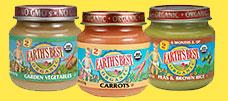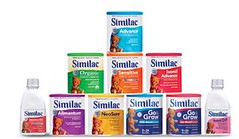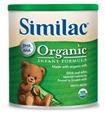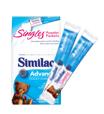For those of you who don't know (yet) about bisphenol-A, it is a chemical which is added to plastics and as sealants on metal (and probably a lot of other things, too). The chemical industry tells us it's wonderful because it makes plastics resilient, clear, basically unbreakable, and it seals metals from foods, as in baby food jar lids. But I don't want to get ahead of myself here.
Evidently, a lot of people have been talking about and researching the negative effects of bisphenol-A for a while. I've been seeing these baby bottles made by BornFree at Whole Foods for a while, with signs on them saying they are free of bisphenol-A. I had no idea what BPA was then and, like a lot of new parents, didn't have a lot of time to research it.
Well, let me tell you, I've been researching. And the news is not good.
NOTE: DO NOT go to a website called bisphenol-a.org for unbiased info. Despite being a DOT ORG, they are actually run by the plastics industry. Other info which is against BPA may not be unbiased either, but at least it isn't the industry itself putting out the info. Remember how the cigarette companies insisted for decades that their research showed that cigarettes were fine for your health, maybe even good for you? And now it's clear that they were purposefully lying.
BPA mimics hormones and is known to disrupt hormone function as well as how chromosomes are sorted. There is evidence that, even at very low doses, it is linked to cancer, diabetes, reproductive development, hyperactivity, and lots of other health problems.
So, with everything else going on right now, we've been researching this BPA thing, calling companies, buying new things (good for the economy, right?) and trying to decide what exactly to get rid of.
This is what I've come up with so far:

Avent bottles - DO contain BPA; they should be avoided. Supposedly, BPA leaches out at a higher rate if the plastic is heated (as in a dishwasher) or if harsh detergents are used on it (as in a dishwasher). I'm guessing that I'm not the only parent who has put baby bottles in the dishwasher thinking that they'll be more sanitary that way. They are working on a non-BPA bottle and will send out a free sample to you if you call them to complain (1-800-542-8368).

Earth's Best organic baby food - the metal lids contain BPA. So much for buying organic because it's better for my baby. And he liked it, too. :-( The cereals in boxes, though, are OK.

Nalgene bottles are apparently bad, too. Which is too bad, because I love my Nalgene bottles. However, Nalgene says they're phasing out BPA bottles within the next few months, and they already have a BPA-free alternative on the market, called their "Everyday" line.



Powdered baby formula is almost always packed in containers that has BPA, at least in the metal tops and bottoms. Some companies also use BPA in the cardboard on the sides of the containers, too. Similac says that their individual packets do NOT contain BPA. (However, you'll be throwing away a lot more trash with this option, but maybe it's worth it.) Although surprisingly, when I checked in the grocery store, it did not appear to be more expensive. And the organic formula does not appear to come in the individual packets. Again, it's ironic that the organic option comes with extra chemicals (no extra charge!! sorry for the sick humor). They also said that the already-prepared liquid has BPA on the lid part, but not in the bottle. If you know of a formula that doesn't have BPA, let me know! The organic stuff from Earth's Best supposedly has even more BPA than the Similac, although I forgot to ask those folks about formula when I was on the phone with them.
In general, plastics with the numbers 3, 6, or 7 on the bottom (in the little recycle symbol) should be avoided. Some #7 materials (which just indicates "other" plastic) are OK, for instance, if it is a combination of #1 and #2, it will be marked as #7. Plastics marked with #1,2,4,5 should be OK for contact with food.
Now for the good news:
The Canadian government ROCKS!! - I have another post coming up with details on this one.

I've already changed to BornFree baby bottles, mostly glass bottles.

Earth's Best organic cereals are in boxes that have no BPA.
I'm making baby food for now, organic, fresh, home-made, BPA-free. Love the pressure cooker.


4 comments:
I'm annoyed (no babies left here) that my brand new Nalgene bottles are no good. God only knows what kind of baby bottles I used...I think those Playtex nursers with the plastic bags. Wasn't that good of me? throwing out dozens of plastic bags all those years?
I used cloth diapers - that has to count for something.
I love cloth diapers. Still no diaper rash over here. Although the washer is broken, which is especially annoying, since we couldn't get an appointment for repair for 4 days.
hey, i wanted to ask you about cloth diapering. do you use a certain type of diaper and cover? i saw some 'g' brand that seemed neat.
oh, the bpa business is a nightmare. that and the lead toys. sheesh.
I bought Bummis Super Whisper Wraps (at least, I think that's what they were called) from somebody on the internet. I also got some nice, thick cloth diapers. I think I've bought them from two or three places so far.
I bought (unbleached) prefolds the last time from Zannadu, as they prewashed the unbleached diapers several times for me for an extra charge, I think it's 35 cents a diaper now. It was worth it for me. All that time, hot water, washing and drying.
I need to buy more, and I just saw on the site that they're having a 5% discount... just enter SPRINGBREAK as the discount code.
Post a Comment